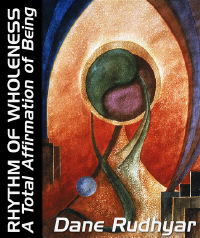 |
| Home | Bio | Art | Music | Literature | Civilization & Culture | Philosophy of Wholeness | Theosophy & Spirituality | Astrology |

RHYTHM OF WHOLENESS A Total Affirmation of Being by Dane Rudhyar, 1983 CONTENTS PROLOGUE PART ONE The Philosophy of Operative Wholeness 1. Prelude to a New Interpretation of Reality 2. The Search for Spiritual Security: The One, the Whole, and Wholeness 3. The Movement of Wholeness PART TWO The Cycle of Being 4. The Structure of the Cycle of Being 5. The Four Crucial Phases of the Cycle of Being 6. The Inevitability of Success and Failure 7. Spirit and Mind Page 1 Page 2 Page 3 Page 4 PART THREE The Cycle of Man 8. Constitution of Man - The Physical and Psychic Bodies 9. Constitution of Man - The Spiritual Entity and the Higher Mind 10. The Structure and Transformation of the Total Person 11. The Cyclic Process of Spiritual Embodiment PART FOUR In The Spirit of Wholeness 12. The Principle of Holarchy and the Interplay of Horizontal and Vertical Relationships 13. Transpersonal Activity versus Mediumship 14. Rites of Passage EPILOGUE |

CHAPTER SEVEN
Spirit and Mind - 4 In the first chapter of this book, I dealt briefly and succinctly with the basic stages through which cultures develop; much more has been discussed in my previous works. (5) This development is a collective manifestation of the growth and complexification of mind during the Noon-to-Sunset period of the great cycle. Ideally, the development of mind in the human mode closely follows the gradual rise to power of the principle of Unity — the energy of the "holy spirit" released through Avatars. Each culture has its particular "creative Word" which is both a vibratory spirit-energy (or "tone") and a set of mind-created forms (prime symbols, religious assumptions, rites, and so on). But because the power of the principle of Multiplicity is still dominant, human beings can respond to this "Word" in many ways. They interpret the Word intellectually and react emotionally to the "tone" of the new release of spirit-energy, according to the state of mental and psychological development they have reached. This state depends largely on the condition of the old, disintegrating culture (which was impressed upon their child mentality) at the time the new surge of avataric power occurred. As already stated, while the human will can be attuned to the rhythm and tone-quality of the Movement of Wholeness, it also may choose, or be inwardly compelled by an overwhelming accumulation of "karmic deposits" (subconscious memories of an ancient past) to oppose a new release of spirit. An individual can resist change and refuse (consciously or subconsciously) to fulfill his or her dharma because he or she is controlled by an ego that is emotionally attached to its form and has developed intense inertia; the more beautiful the form, the more difficult the act of severance may be. While the will of the individualized person is in principle the spiritual determinant, there is both an ego-will and a spiritual will released by the true "individualizing principle" (see Chapter 9). The ego-will is attached to the form built by the mind — the personal self, "I" myself. Peter or Jane — and that form normally is an outgrowth of the equally rigid and taken-for-granted assumptions and forms of behavior of the culture within which the ego was impelled or compelled to develop a particular character. The mind, consciously controlled or semiconsciously fascinated by a strong and rigid ego-will, "freezes" within a particular form. It may develop its potentialities in greater depth, revealing a more complete and encompassing meaning, but it also may totally stiffen and shrink. The circumference of the mandala of personality, the center of which is the ego-will, may become smaller and smaller as the contents of the circle die of starvation. In the end, circumference and center are reduced to a nearly nondimensional point. For human beings this is total failure, even if not absolute non-being. The emptiness of such a condition polarizes the Godhead state of utterly condensed but all-encompassing plenitude of being. Both states are almost totally subjective, but subjectivity can be either the quintessentialization of objective experiences of relationships fully lived into an all-encompassing wholeness of meaning, or a quasi-absolute withdrawal from objectivity and all modes of relatedness — an utterly empty and meaningless state of isolation, a mindless caricature of individual selfhood. As the progressive actualization of all the potentialities of the archetype Man proceeds through a long series of societies and cultures, each of which has the development of one particular aspect of this archetype as its collective dharma, mind becomes an increasingly dominant factor. At first it is the servant of life in an animal-like, instinctual way; but instinct is bound by form and by the need to perpetuate the generic morphology and character of the species with only very gradual changes. In human beings, however, while instinct still operates at the strictly biological level, it is superseded by intelligence — that is, by the capacity to adapt oneself (not only the physical body but the psychic being and the whole personality) to the requirements of any situation. The aim of such adaptation is to provide a maximum of well-being and happiness — and a minimum of discomfort, pain, and organic deterioration. Intelligence refers particularly to a person's capacity to adjust to the demands of his or her sociocultural environment, which also means the ability to acquire the kind of knowledge society expects its valuable and important members to have. Today mind usually is identified with the ability to learn and to accumulate information; but as long as what is learned are systems of interpretation almost totally biased by the culture's basic assumptions and approach to knowledge, the learning mind is the "culture mind." In Euro-American society, which extols analysis, empiricism, a special kind of logic, the proliferation of research projects, and the accumulation of sense data and mechanical information, the culture mind is often called the intellect, even though the word had a far deeper, spiritual meaning in early Greece. Intellectuals now persons of knowledge, well-informed, learned; yet their minds are mainly memory banks, storage depots for undigested and unrelated information. Indeed, information is an unfortunate and confusing term, because unrelated data have no form, and what is called information today is mostly data that are unrelated as yet. The question is, however, related to what? For most people, the taken-for-granted relation is to a culture which always is based on more or less exclusivistic concepts defining what should or should not be accepted as knowledge. The strictly physical, sense-conditioned, reductionist, and statistical methods from which "scientific" knowledge is now solely derived exclude whatever cannot be studied and measured objectively. This is the culture mind at work. Yet as human evolution becomes increasingly polarized by the rise of the principle of Unity, subjective factors inevitably will gain ever greater importance and meaning. For the mind of wholeness is the mind able to integrate as fully as possible objective and subjective experiences. It perceives all situations as integral wholes; it sees Wholeness in operation everywhere and at all times. It perceives humanity as a whole, even though a society based upon the wholeness of mankind today seems more an unattainable Utopia than a possible reality in a relatively near future. The realization that all individuals and communities of human beings constitute a whole cannot be held significantly by a decisive majority of men and women as long as the various collective egos we glorify as "sovereign nations" hold onto their exclusivity. World unity cannot occur when nations have not surrendered their emotional, cultural, religious, and political exclusivism and their animal-like dependence upon a particular territory which has to be controlled by their "maleness" or which, they believe, was given uniquely to them by God. The basic issue not only involves easily roused mass emotions and economic and business interests; for basic as the latter are today, international corporations have globalized them. The issue refers to the quality of mind now in operation on all continents; for mind alone can effectively focus the imprecise and diffuse aspirations of many human beings toward what can only be a dream of unity. Many people assuredly indulge in great subjective dreams of a millennial "New Age," but subjectivity alone cannot engender reality. Reality is the interrelationship of subjectivity and objectivity. Wholeness is reality, and Wholeness, being relatedness, is realized in form. The Movement of Wholeness is form in perpetual motion and re-creation. And this motion at every moment creates in mind the ever-changing yet always harmonic form of the Whole. This Whole is the cosmos. It is also archetypal Man — and it is also you and I, if we allow the mind of wholeness to structure our total being in the image of Wholeness, so that we, too, become Reality — instead of a dream spasmodically mated with a composite of potential greed, lust, anger, and ambition. 5. See Culture, Crisis and Creativity (The Theosophical Publishing House, Wheaton, Illinois, 1977) and Beyond Individualism: The Psychology of Transformation (The Theosophical Publishing House, Wheaton, Illinois, 1979). Return By permission of Leyla Rudhyar Hill Copyright © 1983 by Dane Rudhyar All Rights Reserved.  Web design and all data, text and graphics appearing on this site are protected by US and International Copyright and are not to be reproduced, distributed, circulated, offered for sale, or given away, in any form, by any means, electronic or conventional. See Notices for full copyright statement and conditions of use. Web design copyright © 2000-2004 by Michael R. Meyer. All Rights Reserved. |
 |